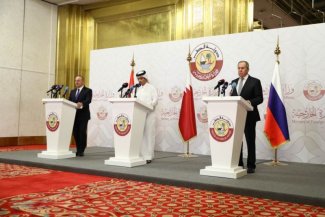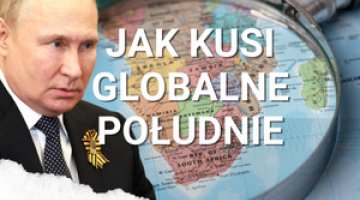Russia activates its policy in the Persian Gulf region
cooperation: Piotr Żochowski

On 9–11 March, the Russian Federation’s Minister of Foreign Affairs, Sergei Lavrov, paid working visits to three Arab monarchies: the United Arab Emirates, Qatar and Saudi Arabia. During his stay in the latter country, he took part in a meeting with his counterparts from Qatar and Turkey. Following these talks, the establishment of a new tripartite consultation format on Syria was announced. At the start of the year, visits to Moscow by the foreign ministers of all the above-mentioned countries preceded Lavrov’s trip.
Commentary
- The Russian minister’s visit to these Arab countries is a demonstration of the intense political and economic relationships that Russia has managed to build with the countries of the region since 2015. These ties prove Russia’s important role in the politics of this part of the world. Lavrov’s visit took place in the context of growing concern among the Persian Gulf’s Arab states about the change in Washington’s policy; on the one hand, the US appears to have given up the strategy of ‘maximum pressure’ on Tehran and is seeking agreement on the Iranian nuclear program, while on the other it has distanced itself from Saudi Arabia (by limiting arms supplies, imposing sanctions, and putting an informal boycott on the heir to the throne, Muhammad ibn Salman). One strategic goal for Russian policy in the region was to weaken the informal American-Arab alliance against Iran in the Persian Gulf. Moscow, which maintains close relations with Tehran, is trying to convince the Arab states to distance themselves from the US and seek a direct agreement with Iran within the framework of the concept of a collective security system in the Gulf region, which it has proposed for many years and put forward again in 2019. However, it does not seem that these initiatives have found fertile ground in the region: the Arab monarchies are too mistrustful of Tehran to give up basing their security on relations with Washington. Meanwhile Russia, by not siding with either side of the conflict and maintaining good relations with both Iran and the Arab monarchies, is maximising its influence in the region and increasing its value in the eyes of each party.
- The situation in Syria was an important topic of Lavrov’s talks with the hosts, as it was during the tripartite meeting in Qatar including the Turkish foreign minister Mevlüt Çavuşoğlu. During the civil war in Syria, the Arab states Lavrov just visited put their support behind the anti-Assad armed opposition, and sought to remove President al-Assad from power, perceiving the conflict in Syria through the prism of their rivalry with Iran (which was Assad’s main ally, along with Russia). Now, Moscow is demanding that the Arab monarchies come to terms with the military defeat of the opposition and recognise the regime. Specifically, it has called for the restoration of Syria’s place in the Arab League and the re-establishment of economic relations with it; it also wants the Arab monarchies to contribute to financing the post-war reconstruction process and getting the opposition to accept Assad’s terms in a UN-sponsored negotiation process which would politically end the country’s internal conflict. The hope is that this will be achieved by the new tripartite format for consultations on Syria which was established at the meeting in Qatar. This group would complement the so-called the Astana Consultative Format created in 2016 by Russia, Turkey and Iran. In this way, Moscow is also attempting to involve at least one of the Sunni Arab states in the process of resolving the Syrian conflict. For now, the United Arab Emirates, which reopened its Damascus embassy in 2018, is proving most susceptible to Moscow’s persuasion; the UAE is now calling for Syria’s return to the Arab League, and has publicly denounced US economic sanctions against the Assad regime. Nevertheless, the prospects for a political resolution of the Syrian conflict remain illusory: neither Riyadh, Ankara nor the Western capitals are ready to recognise Assad as the country’s legitimate president.
- Russia’s relations with the Persian Gulf’s Arab states are also rising in economic importance. Its largest trade partner in the region is the United Arab Emirates: according to data for 2020, turnover with this country amounted to US$3.27 billion. Last year it rose by up to 78%, which made the country Russia’s second-biggest trading partner (after Egypt and before Israel) in the entire Middle East. The value of trade with Saudi Arabia last year reached US$1.7 billion (after 2014 turnover started to drop – to around US$700 million in 2016). For Moscow, however, cooperation in investments is more important. For many years, it has been trying to attract funds from the Persian Gulf’s Arab monarchies. The Russian Direct Investment Fund has signed agreements and joint investment platforms with sovereign investment funds in all the countries Lavrov visited. According to unofficial estimates, the Arab monarchies’ total investments in Russia have reached a sum of around US$25 billion.
- Another priority for Russia is cooperation with Saudi Arabia on setting global oil prices (as part of the OPEC+ consultation mechanism created in 2016). After the fierce conflict between Riyadh and Moscow over this matter in spring 2019, the parties are now implementing the production volume arrangements which they jointly agreed upon.
- Russia is also making intense efforts to enter the regional arms market – the world’s largest. The United Arab Emirates is its only major customer at present, and is still a marginal supplier even for them (according to SIPRI, only about 5% of the UAE’s arms imports in 2016–20 came from Russia). In 2017, the Russian Defence Ministry signed an agreement on technical and military cooperation with Qatar (although this did not come into force until 2019). Preparations are also currently underway to sign an agreement on military cooperation with Saudi Arabia. So far, however, Moscow’s efforts have brought very modest results. Nevertheless, Riyadh remains a prospective partner in developing cooperation on defence industries and arms supplies. On 20 February, as a result of negotiations that have been underway since autumn 2017, an agreement on the joint production of AK-103 automatic rifles and small-arms ammunition was signed. The issue of relocating most of the component production to Saudi Arabia remains the subject of negotiations. In addition, talks are still ongoing concerning the possible supply of Russian weapons; the offer includes S-400E missile systems, Kornet guided anti-tank missiles and TOS1-A thermobaric missile launchers.





